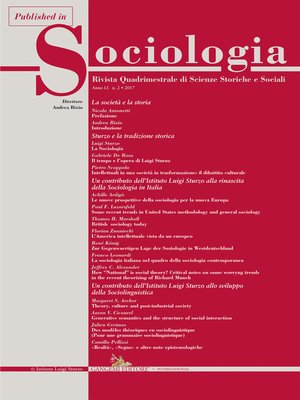Theory, culture and post-industrial society
ebook ∣ Published in Sociologia n. 2/2017. Rivista quadrimestrale di Scienze Storiche e Sociali. Un contributo dell'Istituto Luigi Sturzo allo sviluppo della Sociolinguistica della Sociologia in Italia · Sociologia 2 2017
By Margaret S. Archer

Sign up to save your library
With an OverDrive account, you can save your favorite libraries for at-a-glance information about availability. Find out more about OverDrive accounts.
Find this title in Libby, the library reading app by OverDrive.



Search for a digital library with this title
Title found at these libraries:
| Library Name | Distance |
|---|---|
| Loading... |
The human being and the social agent are not identical. One sign of an adequate social theory is that it performs the introduction between them punctiliously: defective theories settle for reduction of the one to the other. Basically, introducing them is necessary since to be human is simultaneously to be social. Equally fundamentally, reducing them is not on, because a human being is a lot more than a social agent. None of this is nullified by our right and ready awareness that society contains a larger register of cultural meanings and a bigger repository of structural resources than can ever be drawn upon by one person, nor its corollary, that all people necessarily do draw upon them. It should be acknowledged with the same alacrity that without reference to people's biology and psychology, their nature and spirituality, their Weberian «non-social» relations to both the phenomenal and noumenal worlds, we are left with «plastic man» (Hollis, 1977) whose selective permutations on meanings and resources can only be explained by an infinite regress to prior social determination.







